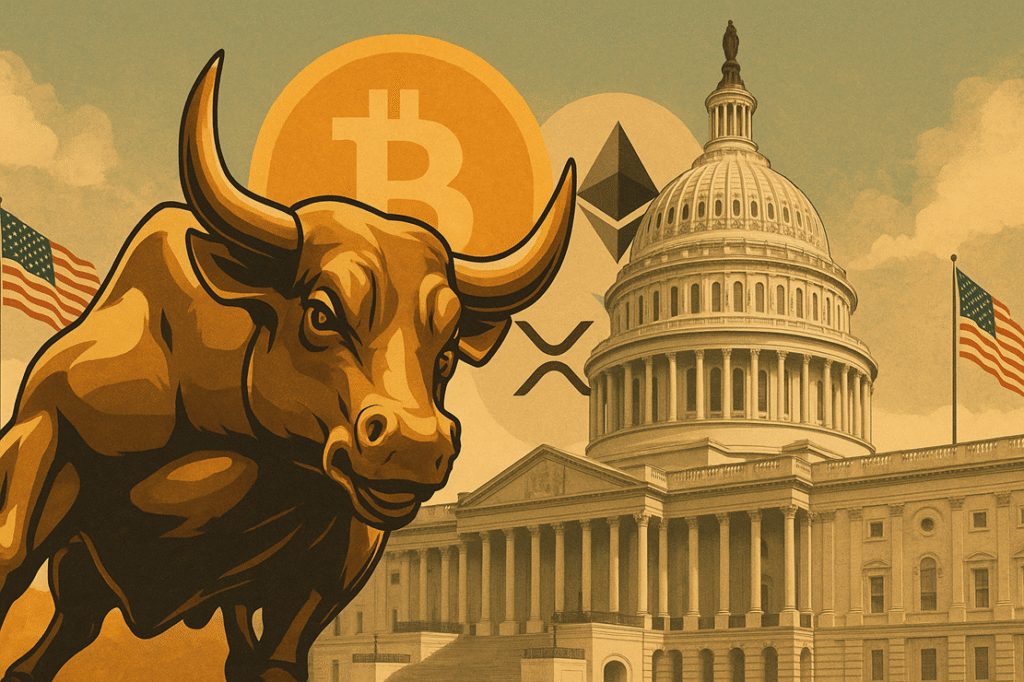In the rapidly evolving world of digital finance, regulatory frameworks and governance structures are crucial to ensuring transparent and secure ecosystems. As the U.S. House of Representatives convenes, a significant focus has been set on digital assets and their legislative future. A comprehensive package of bills is set to be deliberated, reflecting the dynamic intersection of technology, finance, and policy. This legislative push is poised to shape the landscape for stablecoins, central bank digital currencies (CBDCs), and broader digital asset regulations, promising a future aligned with innovation and security.
The Legislative Future of Digital Assets: A Closer Look at Crypto Week
Understanding the Key Crypto Bills and Their Implications
**Stablecoins and the GENIUS Act**
The Senate has already passed the Genesis of Electronic Notes and Issuance Under Supervision (GENIUS) Act, which aims to impose rigorous reserve requirements on stablecoin issuers, mandating one-to-one backing with U.S. currency or equivalent liquid assets. This bill, having gained substantial bipartisan support, is positioned to streamline stablecoin issuance, ensuring transparency and consumer protection.
**Central Bank Digital Currencies (CBDCs) and Regulatory Concerns**
The Anti-CBDC Surveillance State Act seeks to prevent the Federal Reserve from leveraging a central bank digital currency for monetary policy, effectively banning any Fed-issued retail CBDC. Despite moving forward in the House, its future in the Senate remains uncertain due to the lack of a companion bill capable of sidestepping a filibuster.
**Market Structure and the CLARITY Act**
The Digital Asset Market Clarity (CLARITY) Act aims to delineate digital assets into distinct categories: securities, commodities, and approved payment stablecoins. This legislation proposes to extricate the latter two from the traditional securities definition, paving the way for well-defined regulatory pathways. This act also calls for parallel regulatory frameworks from the SEC and CFTC, along with provisional registration guidelines for digital asset exchanges and brokers.
Political Divisions and Strategic Debates
A significant debate within the Republican ranks has emerged, with Representative Warren Davidson cautioning that premature passage of the GENIUS Act might undermine broader regulatory efforts. Concerns revolve around potential scenarios where stablecoin regulations advance while more comprehensive market structuring and CBDC measures do not, leaving foundational gaps unaddressed.
The Democratic Stance
Democrats are voicing concerns over what they view as risky maneuvers in the crypto legislative landscape. Representative Maxine Waters has criticized these proposals, highlighting potential pitfalls and the need for balanced approaches that prioritize consumer protection without stifling innovation.
Market Reactions and Trends
Amidst these legislative developments, the cryptocurrency market has witnessed a surge, with Bitcoin reaching unprecedented heights and altcoins experiencing significant upticks. This legislative buzz has injected fresh momentum into the market, with traders and investors speculating on the potential impacts of these regulatory decisions.
Frequently Asked Questions
What are the core components of the GENIUS Act?
The GENIUS Act requires stablecoin issuers to maintain reserves backed by U.S. currency or similarly liquid assets. It also mandates regular transparency reports, aimed at bolstering consumer protection and financial stability.
How might the Anti-CBDC Surveillance State Act affect monetary policy?
If enacted, this legislation would prevent the Federal Reserve from using a CBDC for implementing monetary policy, effectively banning the issuance of retail CBDCs by the Fed. This means monetary policy tools would remain unaffected by digital currency innovations.
What changes does the CLARITY Act propose for digital asset regulation?
The CLARITY Act proposes classifying digital assets into securities, commodities, and permitted payment stablecoins, removing the latter two from the traditional definition of securities. It calls for cohesive regulatory frameworks by the SEC and CFTC, offering clearer guidance for digital asset exchange operations.
As we anticipate the outcomes of “Crypto Week,” these discussions underscore the complexity and significance of establishing a regulatory framework that embraces innovation while safeguarding market integrity. Whether these legislative efforts transform into law will significantly influence the future trajectory of the digital finance ecosystem.

